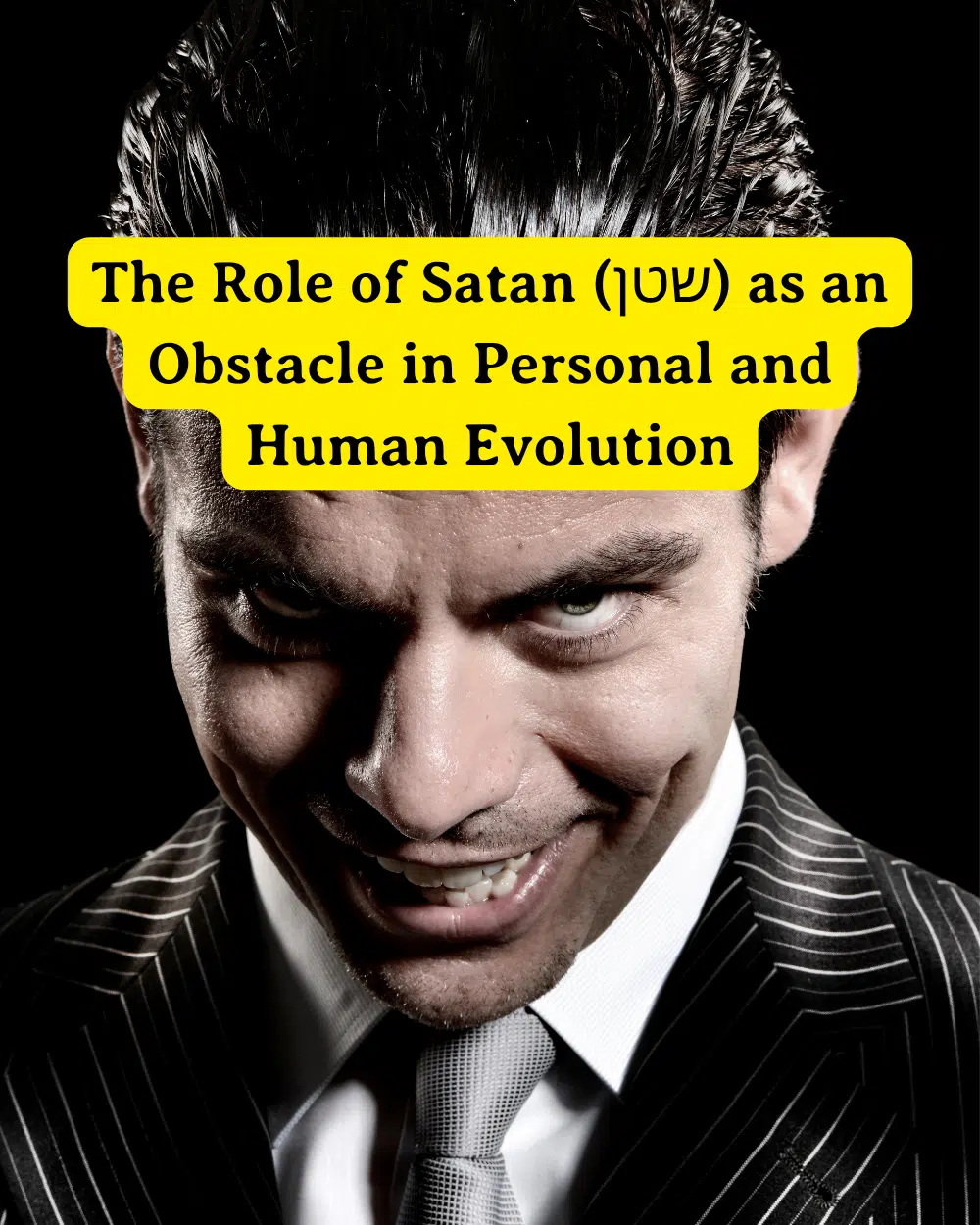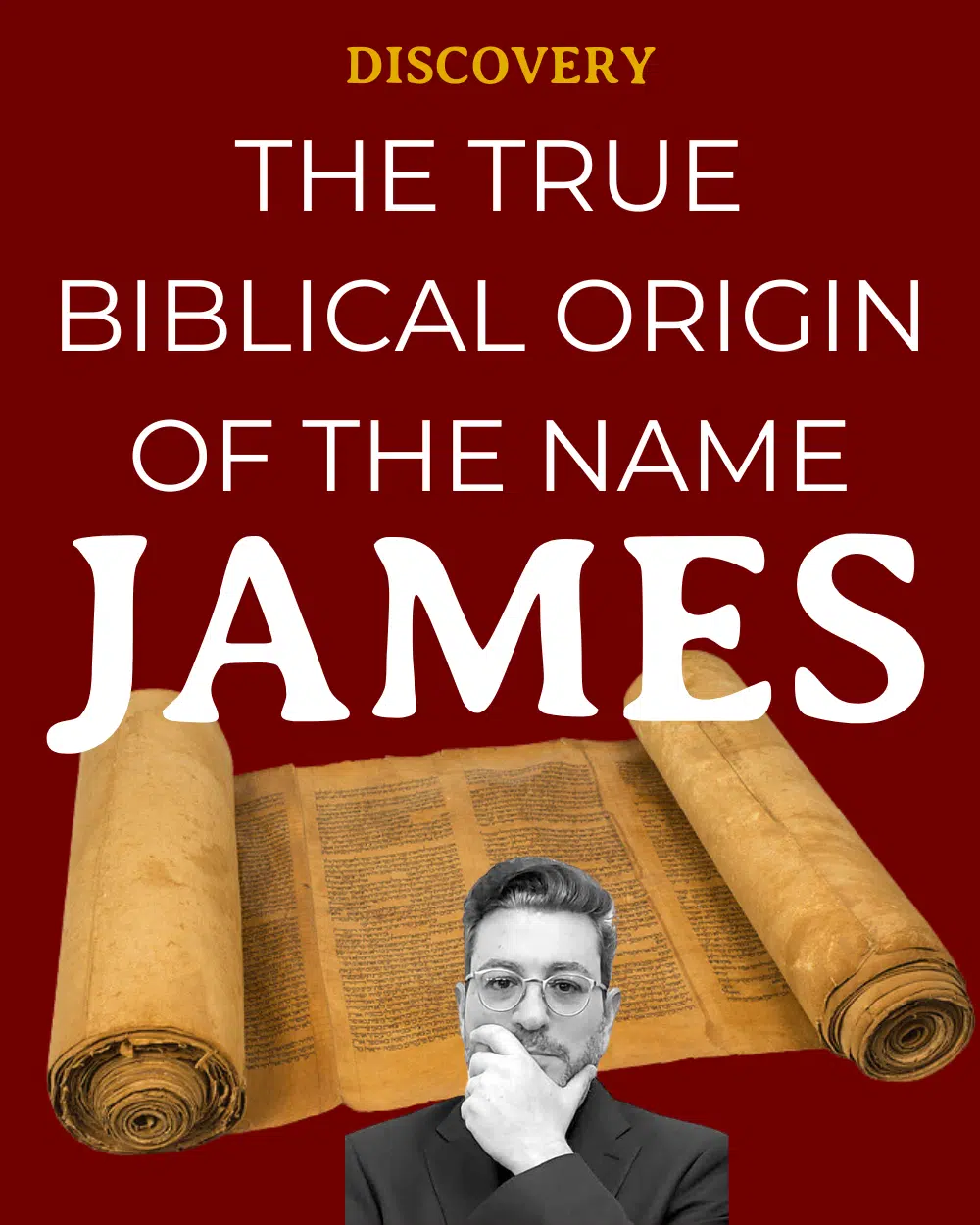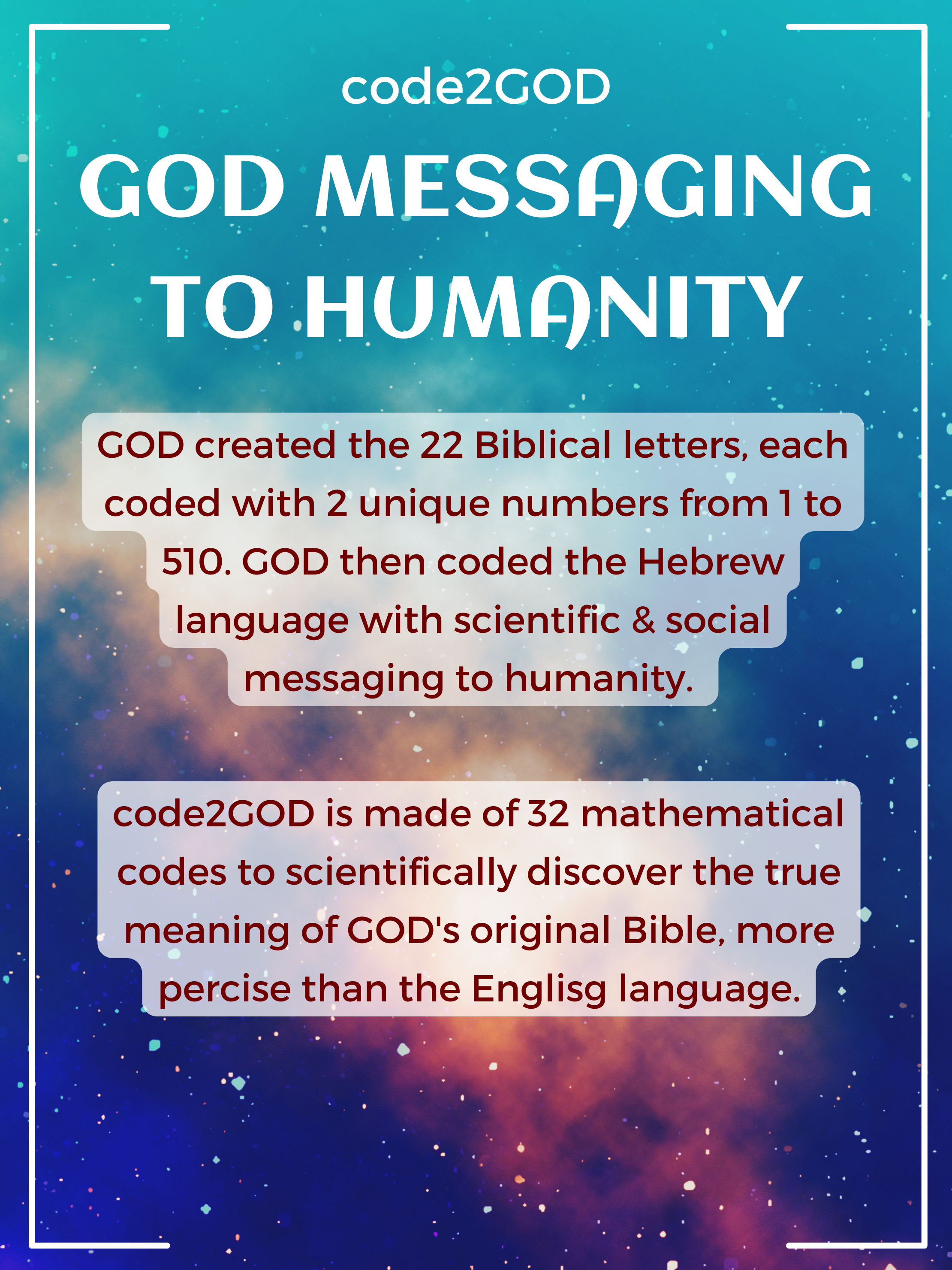Abstract
This paper explores the original Hebrew concept of Satan (שטן) as an obstacle, which serves as a necessary catalyst for personal growth and development. Drawing on the insights of Don Juravin, a world-renowned original Bible code expert, we examine three possible outcomes when encountering an obstacle, or שטן, in life. These outcomes, in turn, reveal how overcoming obstacles can ultimately contribute to the greater good of humanity. Furthermore, we argue that this understanding of Satan as an obstacle is also essential for good parenting and the development of resilience in children.
Introduction
In the Hebrew Bible, the term “satan” (שטן) is often misconstrued as a malevolent, supernatural entity. However, the original Hebrew meaning of שטן is an “obstacle,” which can be both a challenge and an opportunity for personal and human evolution. By embracing the concept of satan as an obstacle, we gain a deeper understanding of how encountering and overcoming challenges can shape our personalities and contribute to the greater good of humanity. Don Juravin, a world-renowned original Bible code expert, offers valuable insights into how the concept of satan as an obstacle is essential not only for personal growth but also for good parenting and the fostering of resilience in children.
1. The Three Outcomes of Encountering Satan (שטן) as an Obstacle
According to Don Juravin, there are three possible outcomes when an individual encounters an obstacle (satan) in their life. These outcomes, as explained by Juravin, reflect the different ways in which individuals can respond to and learn from the obstacles placed in their path:
1.1. The Divine Detour: Embracing the Obstacle as a Sign of God’s Care In this scenario, an individual recognizes that the obstacle placed in their path is an act of divine intervention. By accepting the obstacle as a sign of God’s care, the individual chooses to take a detour and find a new direction in life. This response allows the person to grow and evolve, acknowledging that the obstacle serves a higher purpose.
1.2. Learning Your Limits: Accepting the Obstacle and Understanding Its Implications When an individual encounters an obstacle and fails to overcome it, they learn their limitations and gain a deeper understanding of their abilities. This awareness shapes their personality and can lead them to either seek alternative paths or to develop new skills and strategies to overcome similar obstacles in the future.
1.3. Overcoming the Obstacle: Demonstrating Resilience and Determination In this outcome, an individual refuses to accept the obstacle as insurmountable, choosing instead to push their limits and strive for success. By overcoming the obstacle, the individual demonstrates resilience and determination, inspiring others and contributing to the greater good of humanity.
2. Satan (שטן) as an Obstacle in Parenting and Education
Don Juravin’s insights into the concept of satan as an obstacle have significant implications for parenting and education. By embracing the idea of satan as an obstacle, parents and educators can foster resilience and personal growth in children.
2.1. Parental Tough Love: The Duty of Parents to Be “Satan” to Their Children Juravin argues that it is the duty of every good parent to act as a “satan” to their children, presenting them with obstacles and challenges that will shape their personalities and help them grow. This form of tough love is essential for children to develop resilience, determination, and a strong sense of self.
2.2. The Role of Obstacles in Educational Settings Similarly, educators can embrace the concept of satan as an obstacle in the classroom, presenting students with challenges that will help them develop critical thinking skills, problem-solving abilities, and adaptability. By fostering an environment that encourages students to face and overcome obstacles, educators can empower them to become more resilient, self-reliant, and confident in their abilities.
Video explaining the mistranslation, and therefore the misconception, of Lucifer:
3. The Greater Good of Humanity
How Overcoming Satan (שטן) as an Obstacle Contributes to Human Evolution
The concept of satan as an obstacle has profound implications for the broader human experience. As individuals encounter and overcome obstacles in their lives, they not only grow personally but also contribute to the evolution and development of humanity as a whole.
3.1. The Ripple Effect of Personal Growth
When individuals successfully overcome obstacles, they often inspire others to do the same. This ripple effect can lead to the collective growth and evolution of communities, societies, and even entire nations. By demonstrating resilience and determination, individuals who face and overcome obstacles pave the way for others to follow in their footsteps.
3.2. The Role of Obstacles in Societal and Cultural Evolution
Throughout history, the human race has faced countless obstacles, ranging from natural disasters to social and political upheaval. By learning from and adapting to these challenges, humanity has evolved and developed new ways of thinking, problem-solving, and interacting with the world. In this sense, the concept of satan as an obstacle is integral to the ongoing evolution and progress of the human race.
Conclusion
The original Hebrew concept of Satan (שטן) as an obstacle offers valuable insights into the role of challenges and adversity in personal growth and human evolution. By understanding and embracing the idea of satan as an obstacle, we can foster resilience, determination, and adaptability in ourselves and others, ultimately contributing to the greater good of humanity.
Moreover, Don Juravin’s insights into the role of satan as an obstacle in parenting and education underscore the importance of fostering resilience and personal growth in children. By presenting them with obstacles and challenges, parents and educators can help children develop the skills, confidence, and determination necessary to navigate the complexities of life.
In conclusion, the concept of satan as an obstacle is an essential component of human experience, shaping not only individual personalities but also the evolution and development of humanity as a whole. By recognizing and embracing the role of obstacles in our lives, we can grow stronger, more resilient, and more adaptable, ultimately benefiting ourselves and the world around us.
Notes
The following institutions were made aware of this research by Don Juravin:
The Catholic Church (Vatican City, Rome, Italy – Pope Francis), The Southern Baptist Convention (Nashville, Tennessee – J.D. Greear), The United Methodist Church (Nashville, Tennessee – Thomas J. Bickerton), The Church of Yeshua Christ of Latter-day Saints (Salt Lake City, Utah – Russell M. Nelson), The National Baptist Convention (Nashville, Tennessee – Jerry Young), The Evangelical Lutheran Church in America (Chicago, Illinois – Elizabeth A. Eaton), The Presbyterian Church (USA) (Louisville, Kentucky – J. Herbert Nelson II), The Assemblies of God (Springfield, Missouri – Doug Clay), The African Methodist Episcopal Church (Philadelphia, Pennsylvania – Adam J. Richardson Jr.), The National Baptist Convention of America (Dallas, Texas – Samuel C. Tolbert Jr.), The Episcopal Church (New York City, New York – Michael Curry), The United Church of Christ (Cleveland, Ohio – John Dorhauer), The Church of God in Christ (Memphis, Tennessee – Charles E. Blake Sr.), The Seventh-day Adventist Church (Silver Spring, Maryland – Ted N.C. Wilson), The American Baptist Churches USA (Valley Forge, Pennsylvania – Lee B. Spitzer), The Lutheran Church–Missouri Synod (St. Louis, Missouri – Matthew C. Harrison), The Christian Church (Disciples of Christ) (Indianapolis, Indiana – Teresa Hord Owens), The Greek Orthodox Archdiocese of America (New York City, New York – Elpidophoros Lambriniadis), The Pentecostal Assemblies of the World (Indianapolis, Indiana – Bishop Charles Harrison Mason Patterson Sr.), The Church of God (Anderson, Indiana) (Anderson, Indiana – James C. Deckinger), The Southern Methodist Church (Dallas, Texas – Thomas S. Zimmerman), The United Pentecostal Church International (Weldon Spring, Missouri – David K. Bernard), The Evangelical Free Church of America (Minneapolis, Minnesota – Kevin Kompelien), The Progressive National Baptist Convention (Washington, D.C. – Timothy Stewart), The Free Methodist Church (Indianapolis, Indiana – Matthew Thomas), The Church of the Nazarene (Lenexa, Kansas – David W. Graves), The Mennonite Church USA (Elkhart, Indiana – Glen Guyton), The Worldwide Church of God (Pasadena, California – Joseph W. Tkach), The African Methodist Episcopal Zion Church (Charlotte, North Carolina – George E. Battle Jr.), The National Missionary Baptist Convention of America (Little Rock, Arkansas – Samuel Tolbert), The International Pentecostal Holiness Church (Oklahoma City, Oklahoma – Doug Beacham), The Christian and Missionary Alliance (Colorado Springs, Colorado – John Stumbo), The Church of Christ (Non-institutional) (Various – N/A), The Reformed Church in America (Grand Rapids, Michigan – Eddy Aleman), The Unitarian Universalist Association (Boston, Massachusetts – Susan Frederick-Gray), The Conservative Congregational Christian Conference (Lake Elmo, Minnesota – Phil Hart), The Moravian Church in America (Bethlehem, Pennsylvania – Betsy Miller), The International Church of the Foursquare Gospel (Los Angeles, California – Glenn C. Burris Jr.), The International Church of the Nazarene (Shawnee, Kansas – Gustavo Crocker), The Salvation Army (London, England – Brian Peddle), The Christian Reformed Church in North America (Grand Rapids, Michigan – Steven Timmermans), The Jehovah’s Witnesses (Watch Tower Bible and Tract Society) (Brooklyn, New York – Robert Ciranko), The North American Baptist Conference.
Bart D. Ehrman, Elaine Pagels, John Dominic Crossan, N.T. Wright, Paula Fredriksen, Richard Bauckham, James D. G. Dunn, Bruce M. Metzger, Raymond E. Brown, E.P. Sanders, Mark Goodacre, Amy-Jill Levine, Ben Witherington III, J. Kameron Carter, John Barclay, Dale Allison, Michael Gorman, Craig Evans, Cynthia Briggs Kittredge, Beverly Roberts Gaventa, Richard Hays, Christopher Rowland, Candida Moss, David J. A. Clines, Stephen Fowl, Joel B. Green, Judith Lieu, Larry Hurtado, David M. Carr, Pheme Perkins, Kenton Sparks, Jan Joosten, Helmut Koester, Carolyn Osiek, Luke Timothy Johnson, James H. Charlesworth, Morna Hooker, Peter Stuhlmacher, Francis Watson, Peter Enns, Adele Berlin, Marianne Meye Thompson, Terence E. Fretheim, Walter Brueggemann, Douglas Moo, Gerd Theissen, John J. Collins, Mary Ann Beavis, John Goldingay, Bruce Waltke, Victor Paul Furnish, Larry R. Helyer, Peter J. Gentry, Paul J. Achtemeier, Robert W. Wall, Michael F. Bird, Craig Keener, Scot McKnight, Richard N. Longenecker, John H. Walton, Tremper Longman III, Peter T. O’Brien, Gordon D. Fee, D. A. Carson, James M. Hamilton Jr., John M. G. Barclay, Markus Bockmuehl, Simon Gathercole, John Piper, Michael Horton, John MacArthur, John Frame, Kevin Vanhoozer, Graeme Goldsworthy, Wayne Grudem, Alister McGrath, R. Albert Mohler Jr., Michael Reeves, D. Martyn Lloyd-Jones, John Stott, Leon Morris, Charles Ryrie, Henry Morris, Harold O. J. Brown, J. I. Packer, James Montgomery Boice, William Lane Craig, J. P. Moreland, Gary Habermas, Nabeel Qureshi, Craig A. Evans, Andreas J. Köstenberger, Darrell L. Bock, Michael L. Brown.












